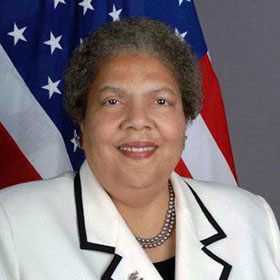Harriet Lee Elam-Thomas, with Jim Robison
Potomac Books, 2017, $29.95/hardcover, $19.04/Kindle, 248 pages.
During his short but influential life civil rights leader Dr. Martin Luther King Jr. said: “People fail to get along because they fear each other; they fear each other because they don’t know each other; they don’t know each other because they have not communicated with each other.” This is as true internationally as it is domestically.
Harriet Elam-Thomas spent a brilliant Foreign Service career successfully encouraging communications between American publics and our foreign interlocutors in order to promote mutual understanding and support for U.S. foreign policy.
She has now written a captivating, inspiring memoir that breathes life into the American dream and skillfully recounts her improbable rise through the diplomatic ranks using the arts as a diplomatic tool while proving the value of cultural competency and diversity in U.S. foreign policy.
Diversifying Diplomacy brings American history alive through the eyes and experience of one who progressed from “the little Elam girl from Roxbury” to Ambassador Extraordinary and Plenipotentiary. It is a wonderful treatise on how American values and traditions, warts and all, shaped her life and contemporaneous U.S. foreign policy.
Named after American abolitionist Harriet Tubman, “the little Elam girl” grew up under the tutelage of wise, determined parents who fled the Old South to Massachusetts during the Great Migration. She was fortunate to have siblings who were much more interested in the arts than she and who helped to awaken a cultural appreciation that would serve as an excellent foundation for public diplomacy work.
She was equally fortunate to participate in the Experiment in International Living’s Student Exchange Program, which planted the seed for her interest in international affairs and foreign languages, beginning with French. She subsequently learned Greek at the age of 42 and Turkish at the age of 47.
There is never a dull moment in Harriet’s career, nor in this sometimes humorous page-turner that brings to life her years as an exceptional public affairs officer.
But wait! She began as a secretary at Embassy Paris, followed by time in the White House during the Nixon administration. Perhaps Harriet’s dedication to mentoring, her commitment to making the Foreign Service more diverse and her determination to excel were galvanized by the poor reception she received on entering the Foreign Service as an officer, her degree in international relations from Simmons College notwithstanding.
Determined to prove that excellence knows no color or gender and that she was fully prepared to support the achievement of U.S. foreign policy goals, Harriet set out on an overseas odyssey beginning as a junior officer in Senegal. She went on to Greece, Turkey, Cyprus and Brussels, before ending back in Senegal as U.S. ambassador with a new spouse, Wilfred Thomas.
Between postings in Brussels and Senegal, Harriet occupied the highest-ranking Foreign Service position in the United States Information Agency-that of Counselor. She had the complex task of overseeing the merger of USIA into the State Department. Her understanding of the value of public diplomacy and of the State Department’s bureaucracy was invaluable in successfully managing a difficult transition, whose merits are still being debated.
This is not an ordinary memoir in that it focuses as much on the people who impacted Harriet’s life as it does on Harriet herself. She paints a vivid picture of the influence that such world figures as Nelson Mandela had on her decision-making, and the importance in her career of Foreign Service greats such as O. Rudolph Aggrey and Monteagle Stearns, her ambassadors in Senegal and Greece respectively, and political appointees such as Alan Blinken, her ambassador in Brussels.
There were many other interesting personalities, both American and foreign, whose presence in Harriet’s life helped to make her story so compelling. Allan Goodman of the International Institute of Education typifies the former and Melina Mercouri, the Greek minister of culture, occupies a prominent place among the latter.
Now at the University of Central Florida as director of the Diplomacy Program, Harriet is educating a new generation of potential Foreign Service officers who can but hope for careers as influential and exciting as her own.
Ambassador (ret.) Ruth A. Davis is chair of the International Women’s Entrepreneurial Challenge. During her Foreign Service career, she served as a consular officer overseas in Zaire, Kenya, Japan, Italy and Spain; as consul general in Barcelona; and as U.S. ambassador to The Republic of Benin. Among other domestic assignments she served as Director General of the Foreign Service and director of the Foreign Service Institute, where she established the School of Leadership and Management.


